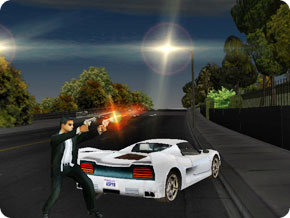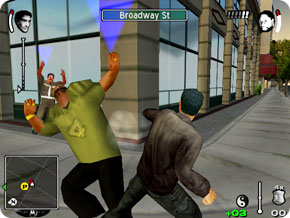By Brad Cook
FADE IN
The scene: a bright, clear day. A convertible makes its way through L.A.’s maze of freeways as George, a former beat cop who now pushes paper, begins his somber voice-over.
“They call it the city of angels. Funny, in my 30 years here, I haven’t seen a single one. My old friend Henry Wilson used to say, ‘People dare to dream here.’ He liked that about L.A. I say: ‘Woah, dreaming will get you killed.’ Maybe I was right: nobody knows what happened to Henry all those years ago. But whatever it was, he didn’t deserve it.”

The camera pushes in on the convertible’s driver, a handsome young man with a carefree attitude, as George explains that he stepped aside in deference to a younger generation of cops, including the one we see before us.
“Will he live to see the sun set?” George asks as the driver winks at a pair of young women in the car next to him. “I don’t know. And there are times I just want to tell him, ‘Give it up, go be a lawyer or a doctor, something.’ But it ain’t my place.
“Besides, that would be a disservice to his old man. See, there are unanswered questions here. And I know that one day someone will get to the truth. What happened to Henry was a true crime. And if there’s one man who deserves to find out the truth, it’s his son, Nicholas Kang Wilson. This is his story.”
You are Nick Kang.
Act One: Set the Scene
Nick’s goal: Investigate the crime wave instigated by the Triad, a gang that terrorizes Chinatown. Despite the fact that the police force recently suspended him for use of excessive violence, Nick’s willingness to do whatever it takes to collar the bad guys make him the perfect field agent for the Elite Operations Division (E.O.D.).
Nick’s motivation: A burning desire to discover what really happened to his father. He suspects the Triad investigation will lead him in the right direction.
Nick’s complication: Rosie Velasquez, a gang-member-turned-cop asked to accompany Nick and make sure he doesn’t go too far over the line. She’s not happy about a babysitter assignment, and Nick doesn’t like working with a partner.
Act Two: The Plot Thickens
Despite the cinematic overtones, however, True Crime doesn’t play in a linear fashion. Between the major story beats, you can go on side missions to bust perps or simply explore the game map, which covers 240 square miles of realistic L.A. scenery. You’ll pass the Staples Center, Mann’s Chinese Theater and other well-known landmarks as you drive down such recognizable streets as Venice Blvd. and Hollywood Blvd.
Or, we should say, careen down those streets. You won’t catch any of the bad guys if you obey all the traffic laws. If you trash your ride, you can always look on the map for a repair station or simply hop out and commandeer another one. Just watch out for innocent bystanders: every time you hurt one, you lose reward points, which are the currency you need to fix you car, gain back lost health and access the 24/7 facilities where you can upgrade skills. You earn reward points every time you solve a crime or successfully complete a mission.
And unlike in a movie, True Crime’s storyline branches in different directions depending on your behavior. Lose too many reward points and Nick will be considered a bad cop, which reflects in the way the other characters in the game respond to him. Go too far and you could spark civil unrest, which causes civilians to attack Nick. Eventually, the police will get involved and try to arrest him. You can cool down the situation by performing good deeds.
Act Three: Climax and Denouement
The game actually features three endings. Which one you see depends on how well Nick conducts himself and how successfully he completes his missions. Given that you can still move the story forward even if you don’t complete all the requirements of a mission, those little failures can catch up by the end.
As George says at the beginning of the game, there are unanswered questions about the fate of Nick’s father, and it would be a shame if he couldn’t answer them by the end.
FADE OUT


